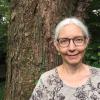Bill Jansen’s Career: A Shining Example of Development Anthropology
Josie Gallegos (anthropology major), Bill Jansen, Kathy Jansen, and Alexis Farmer (anthropology major), after the talk.By Monica Udvardy
Dr. William Jansen II returned to UK’s anthropology community on January 27, 2023, to give the Department of Anthropology's Annual Alumni Talk. Bill earned his bachelor's degree in anthropology with honors from the department in 1971 and went on to earn his master's and doctorate in anthropology at the University of Wisconsin-Madison in 1975, based on fieldwork in the Canadian Arctic.
In 1976, Bill began his long and distinguished career with the United States Agency for International Development (USAID). He started as a social science analyst for development assistance programs in Southeast Asia.
As his career unfolded,




